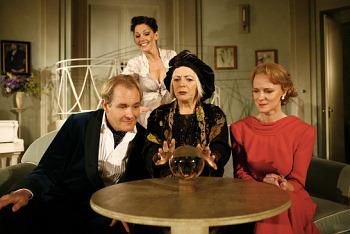Blithe Spirt - Apollo Theatre 2011
First aired in the West End 70 years ago, this is probably Noël Coward's most famous play - famously written in less than a week. Regularly revived, it nevertheless strikes me that, like one of its own central characters, this 'light comedy' doesn't know when it has effectively 'passed over'. That's not to say that it's without humour, and as it's the work of a major writer it's of considerable historical significance. But its roots lie in a time when humour was a very different kind of beast. Nowadays, its gentile comedy lacks real bite, requiring substantial visual reinforcement.
The plot revolves around one Charles Condomine, a novelist who organises a séance at his home as part of his research for a new novel. Inadvertently, the medium Charles invites to his home to conduct the séance accidentally conjures up Charles's dead wife, Elvira. Only Charles (and the audience) can see Elvira which provides some mirth when his comments to his former wife are taken by his current wife as being directed at her. The medium is summoned on numerous occasions to return Elvira to the spirit world, but without success. And Elvira decides she'd like Charles to join her in the afterlife and lays traps to cause his demise.
The plumb role in this play is that of Madame Arcati, here played with twin-set gusto and confidence by Alison Steadman. Preparing for contact with those who have 'passed over' (one cannot use the term 'dead' she tells us) she performs a kind of ritual dance, complete with shrieks and stomps, that one might think was guaranteed to scare off even the heartiest of ghosts. Ms Steadman's performance embodies more than a hint of Margaret Rutherford's rather masculine, matronly style that I remember from old Miss Marple films. But it's not out of place, because Ms Rutherford was the original Madame Arcati.
Hermione Norris is excellent as Condomine's current wife, Ruth, who has to endure the intolerable presence of Charles's ghostly former spouse. Ms Norris has poise, dignity and refinement, though all those qualities are severely tested. Ruthie Henshaw is the ghostly first wife who in the first part of her performance sports a huge smile which, though dazzling in its brilliance, makes the character seem almost demented, rather than simply amused. Robert Bathurst's Charles is rather too laid-back and effete even for a novelist, and his vocal delivery is rather hurried and repetitive in tone, to the extent that his lines were often hard to hear. Jodie Taibi makes the most of her part as Edith, the maid, even if her habit of carrying-out her duties at breakneck speed seems oddly unfunny. However, her deliberate, almost slow-mo entrance culminating in a skilful demonstration of the splits (partly obscured from my restricted view seat), won a well-deserved round of applause.
Several commentators have expressed concerns about the apparent misogyny in this play. Though it's true that Condomine bickers with both his wives and they come across as petulant to some degree, it seems to me that Coward was making fun of marriage, rather than displaying any real hatred of women. I think his point of view would have been that his play was written essentially as a comedy rather than social commentary or a skirmish in a gender war. Even so, I don't doubt that audiences may detect something more sinister lurking under the surface.
The real sparks fly in this production right at the very end, for the remainder of the time it's authentically competent and professional, but hardly innovative. But that's more to do with the play itself - without the Coward brand behind it, I doubt this 'light comedy' would be produced very often, if at all.
"It's a doggedly decent revival that has, you feel, seen better days."
Michael Billington for The Guardian
"Coward called the play 'a light comedy about death'. It certainly requires a real lightness of touch, which in Thea Sharrock's production it doesn't get."
Henry Hitchings for The Evening Standard
"Thea Sharrock's stylish, but often disconcertingly chilly revival, it strikes me as a heartless and at times downright misogynistic piece."
Charles Spencer for The Daily Telegraph
Originally published on

